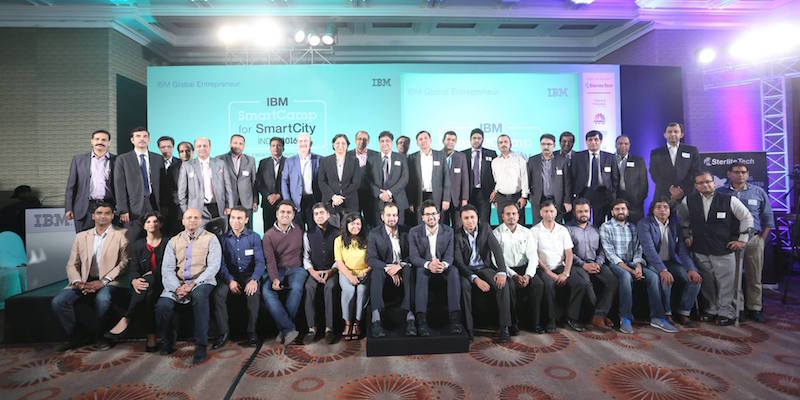This story is sponsored by IBM
The recently-held IBM Smartcamp for Smart Cities organised by the IBM Global Entrepreneur program in association with Sterlite Technologies saw participation from startups with solutions in the space of Energy & Utility, Transportation, Sanitation, Water, Citizen Management, Safety and Surveillance. Of the 115 applicants, these 10 startups went on to the final round:
Zippr Private Limited
Address discovery and its efficient implementation is key, especially in a market like India. Zippr fundamentally transforms how locations are referenced, shared and found by replacing the traditional door number with an innovative 8-character digital address format.
The Indian government is implementing the startup’s patent-pending road-based encoding technology across the country through a closed-loop ecosystem.
Zippr licenses its data and map APIs to businesses. Zippr’s digital door numbering solution works with address authorities such as municipal corporations and urban development bodies to replace the traditional door number with a Zippr code. The startup uses both mobile technology (Android, iOS), search platform (elastic search), open-source tech stack (MEAN) and other advanced data science techniques.
We Do Sky
From helping map smart cities, to predicting solar power potential, or transforming how mining is done in the country, this seven-member startup helps organisations untangle challenges on the ground through unmanned aeriel systems, geographic information systems, and computer vision
We Do Sky uses drones for aerial shoots, processes the data collected and extracts intelligent inputs to provide solutions for major problems across sectors such as agriculture, mining, utilities and infrastructure and urban planning, significantly bringing down the time and cost. Their software is designed from the grounds up for the Indian terrain.
Their clients include the Indian Government, corporates, research and educational institutes, and start-ups.
Get My Parking
The problem of inefficient parking impacts several aspects of urban development leading to congestion, increased carbon emissions and loss of productivity.
This startup is working to transform this space by creating a complete smart parking ecosystem. Using the app, the driver gets real-time visibility and information about parking at his destination including the time needed to park the car at the indicated spot. He has the option of choosing value-added services like a car wash, or a snack. While leaving, he directly exits the parking having already paid via m-wallet. Globally, the smart parking space has seen an investment of $300 million in recent years, but existing solutions are not flexible enough to succeed in emerging markets.
The differentiator for Get My Parking is that their frugal innovation allows them to digitise any unorganised parking at a fraction of the cost of other alternatives and aggregate the supply side (contractors and government). This gives them a virtual monopoly of parking data in India.
Oizom Instruments Pvt. Ltd.
Ever-increasing industrialisation have increased the challenges relating to pollution monitoring. The heavy energy consumption and operational costs of existing pollution monitoring systems does not make them sustainable in the long run. Oizom’s solution “Polludrone” is a solar powered IoT air-quality monitor which is also low-cost, compact and eco-friendly.
It works on patent pending technology and measures particulates, toxicity, odour, radiation, light, noise and other parameters on a real-time basis. The findings are made available through a cloud analytics platform and mobile app. Polludrone is capable of measuring all the parameters included as compliance by the Central Pollution Control Board.
Flamencotech (I) Pvt. Ltd.
This startup provides Intelligent Digital Infrastructure Solutions through consultative solutions and a co-creation approach, enabling its customers to solve business pain points. In the context of Smart Cities, the startup’s solution acts as an overlay to all technologies making…

